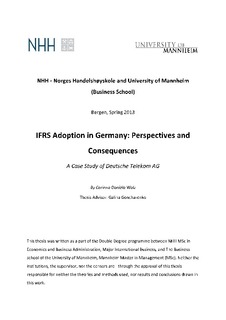IFRS adoption in Germany : perspectives and consequences : a case study of Deutsche Telekom AG
Master thesis
Permanent lenke
http://hdl.handle.net/11250/196752Utgivelsesdato
2013Metadata
Vis full innførselSamlinger
- Master Thesis [4372]
Sammendrag
Themandatoryadoption of the International Financi al ReportingStandards(IFRS)as basis
for the preparationof consolidatedfinancialstatementsin 2005constituteda major change
in accountingregulationsin Germany.Thisthesisfocuseson gaininga deeperunderstanding
of the consequencesthis changehad on the financial reporting of Germancompanies.For
this reason,the financial reporting basedon the previousGermanaccountingregulations
(GermanGAAP)is comparedto the reporting under IFRSregulations.Thisis doneboth on a
theoretical level and in a casestudy approachbased on one specificcompany,Deutsche
TelekomAG.Theresearchproduceda numberof keyfindings:Thelargestdifferencesin the
financialreporting under the two accountingsystems arisein the recognitionand valuation
of intangible assets,provisionsand deferred taxes, leading to a considerableincreasein
equity in the first yearof IFRSadoption at Deutsche Telekom.In the subsequentyears,the
level of provisions as well as the annual expensesfor depreciation, amortization and
impairmentsremainedsignificantlylower. Themain conclusionsdrawn from this research
are that financial reporting under IFRSis lessconservativethan under GermanGAAPand
there are fewer possibilitiesto smooth earningsvia reserves.Moreover, it is visible that
accountingpracticesadopted under IFRSare influenced by previous national accounting
regulations,howeveronlyto a certaindegree
